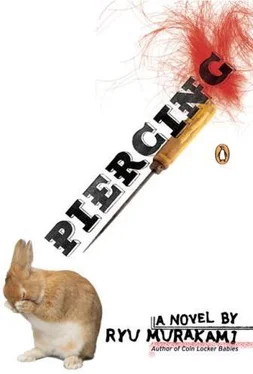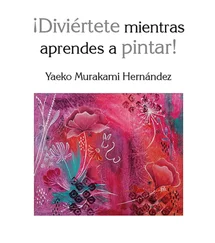Ryu Murakami - Piercing
Здесь есть возможность читать онлайн «Ryu Murakami - Piercing» весь текст электронной книги совершенно бесплатно (целиком полную версию без сокращений). В некоторых случаях можно слушать аудио, скачать через торрент в формате fb2 и присутствует краткое содержание. Год выпуска: 2007, ISBN: 2007, Жанр: Старинная литература, на английском языке. Описание произведения, (предисловие) а так же отзывы посетителей доступны на портале библиотеки ЛибКат.
- Название:Piercing
- Автор:
- Жанр:
- Год:2007
- ISBN:978-1-429-55255-4
- Рейтинг книги:4 / 5. Голосов: 1
-
Избранное:Добавить в избранное
- Отзывы:
-
Ваша оценка:
- 80
- 1
- 2
- 3
- 4
- 5
Piercing: краткое содержание, описание и аннотация
Предлагаем к чтению аннотацию, описание, краткое содержание или предисловие (зависит от того, что написал сам автор книги «Piercing»). Если вы не нашли необходимую информацию о книге — напишите в комментариях, мы постараемся отыскать её.
Piercing — читать онлайн бесплатно полную книгу (весь текст) целиком
Ниже представлен текст книги, разбитый по страницам. Система сохранения места последней прочитанной страницы, позволяет с удобством читать онлайн бесплатно книгу «Piercing», без необходимости каждый раз заново искать на чём Вы остановились. Поставьте закладку, и сможете в любой момент перейти на страницу, на которой закончили чтение.
Интервал:
Закладка:
Kawashima hadn’t opposed Yoko’s decision to quit her job. He’d made up his mind right from the beginning to support her in anything she chose to do. Nor did he express any reservations when she said she wanted to have a baby. The other guys in the office often teased him about how much he’d changed since his marriage, how much more cheerful he was. ‘What exactly is Yoko-chan putting in that bread of hers?’ — that sort of thing. He himself wasn’t really sure if he’d changed or not. But ever since he’d met Yoko, and especially since the day they’d decided, at her suggestion, to marry, his bouts of self-loathing had all but ceased. Not once had he been overwhelmed by the old panic and terror, not even when Rie was born and he first held her in his arms. Not, in fact, until ten nights ago.
The mental and emotional torment of the old cycle of anxiety — unable to bear being alone, wanting someone always near but growing anxious when someone does get close, fearing that if they get any closer there’s no telling what might happen, until the fear itself becomes unbearable and solitude seems the only solution — had seemed to be fast becoming a thing of the past.
Until ten nights ago , Kawashima muttered to himself, flicking the switch on the lightbox atop his desk. On its glass lid he arranged several of the thirty-five-millimetre slides he’d taken from the company archives. They were photos he was considering for a poster advertising the Yokohama Jazz Festival, though none of them had anything to do with jazz. Choosing graphics that had no direct connection to the product was something of a speciality of his. When the first indoor ski-slopes were about to open in Kyushu, his presentation — with copy that read THERE’S A FIRST TIME FOR EVERYTHING splashed across a photo of a little Caucasian boy and girl kissing — had won out over all the other agencies and made him a minor hero at the office. The photos he’d assembled for the jazz festival were black-and-whites of fashion models from the 1940s. The girls were all healthy specimens with generous smiles, lying on sandy beaches or about to dive into pools or strolling beneath parasols or drinking cocktails on a terrace. .
But it was impossible to care about any of this right now.
Ten nights ago. He was in the bathtub with the baby, having just finished washing her. He handed her over to Yoko, who was waiting with a fluffy bath towel, and then he leaned back in the tub, leaving the pebbled-glass shower door partially open. Yoko was murmuring to the baby as she dried her, and he was aware of himself smiling at them. And then, with no prelude or warning, a thought came percolating up into his brain and he felt the muscles of his cheeks twitch and freeze.
I wouldn’t ever stab that baby with an ice pick, would I?
For a moment, he wasn’t certain who was sitting there in that steam-filled tub. Yoko opened the bathroom door to leave, then looked back and said something to him, but it wasn’t registering. Masayuki? Masayuki, what’s wrong? What’s the matter? She called to him several times before he snapped out of it.
‘Oh, still there? Guess I was daydreaming,’ he said, and by the time his eyes were refocused on her and the baby, his skin — in spite of the very warm water — had turned to gooseflesh.
The sharp, gleaming point of an ice-pick: from that moment on, he couldn’t get the image out of his head. You wouldn’t do something like that, you would never stab the baby, he told himself hundreds of times, but the voice inside him never stopped replying: I just might . And each night from then on he’d found himself unable to go to bed until he stood over the crib, ice pick in hand, to confirm to himself that it was all right, he wasn’t going to stab her.
Kawashima turned off the lightbox. He got his leather jacket from the closet, put it on over his sweater, and headed for the door.
3
THEIR APARTMENT WAS ON the second floor of a four-storey building. He closed the door noiselessly behind him, checked several times to make sure it was locked and made his way down the stairs. There was no guard or watchman in the lobby: to enter through the glass doors you had to either punch in a code or have someone buzz you in over the intercom. To exit, of course, you simply touched the sensor plate marked OPEN, but the landlord had stressed the importance of taking precautions to prevent strangers slipping inside as you walked out. Not long before, someone apparently disguised as a delivery man had burgled one of the apartments; kids had been known to spray-paint graffiti on the lobby walls; and some jerk had once melted the intercom’s plastic number pad with a lighter.
Outside, Kawashima zipped up his jacket and raised its fluff-lined collar, reflecting that he rather enjoyed the cold. In heated rooms, he often felt the outlines of his body, the border between him and the external world, grow disturbingly fuzzy.
Yoko had awakened but hadn’t seemed to notice anything, and for the moment, standing on the empty street of their neighbourhood in Kokubunji, away from the room with the sleeping baby, he felt a certain degree of relief.
It’s just my neurosis, he reasoned with himself. I just get freaked out imagining I might stab the baby. It’s not as if I actually want to stab her. Who doesn’t imagine things that make them anxious? Maybe nothing this extreme, but, like, having to give a speech at a wedding, for example — a lot of people are terrified of screwing up and being ridiculed or laughed at. Or you can accidentally make eye contact with some psycho on the train and think, What if he gets off behind me and follows me home? Thanks to the imagination, there’s no end to things in this world that can trigger anxiety. Normally, of course, you can free yourself from fears like that just by facing them, or telling someone about them.
Normally.
On the ground floor of the building next door was a video shop. At the end of a long day, after dinner and a bath, Yoko liked to sit with a glass of wine or beer and watch a movie. One night in the last month of her pregnancy, the two of them had watched Basic Instinct together. Kawashima wanted to flee the room as soon as he saw the first scene, which depicted a murder by ice pick, but Yoko said, ‘I’m not sure this is good for the baby, but it’s an interesting story, isn’t it?’ It was that attitude of hers, that detached amusement, that helped him calm down and sit all the way through the film.
Often during the past ten days he’d wondered why his fear was of stabbing only the baby and not Yoko. Remembering the time they’d watched Basic Instinct together gave him the answer: because Yoko could talk to him. Talking with someone helped neutralise the power of the imagination. And Yoko had a delicate but skilful way of dealing with the wounds he carried inside. Her attitude was neither insensitive nor indulgent — neither, Why don’t you just get over it? nor, Oh, you poor thing! She never went out of her way to avoid the subject, and when it came up her comments were always both clear-eyed and supportive.
‘When you have a chronic illness,’ she’d tell him, ‘getting frustrated or impatient with it just makes things worse, right?’ Isn’t that what they say? That you have to live in harmony with an illness? To think of it as an old friend?’
Or: ‘Why is it that when people grow up they totally forget how vulnerable and helpless they were as children?’
Or: ‘Until Rie was born, I never knew how stressful having children can be. I’m sure even your mother must wonder what she could have been thinking back then.’
The way she’d say these things never failed to soothe and comfort him. The first scene of Basic Instinct was a jolt to his system, but by the time the ice pick reappeared later in the film he was thoroughly enjoying the story.
Читать дальшеИнтервал:
Закладка:
Похожие книги на «Piercing»
Представляем Вашему вниманию похожие книги на «Piercing» списком для выбора. Мы отобрали схожую по названию и смыслу литературу в надежде предоставить читателям больше вариантов отыскать новые, интересные, ещё непрочитанные произведения.
Обсуждение, отзывы о книге «Piercing» и просто собственные мнения читателей. Оставьте ваши комментарии, напишите, что Вы думаете о произведении, его смысле или главных героях. Укажите что конкретно понравилось, а что нет, и почему Вы так считаете.












